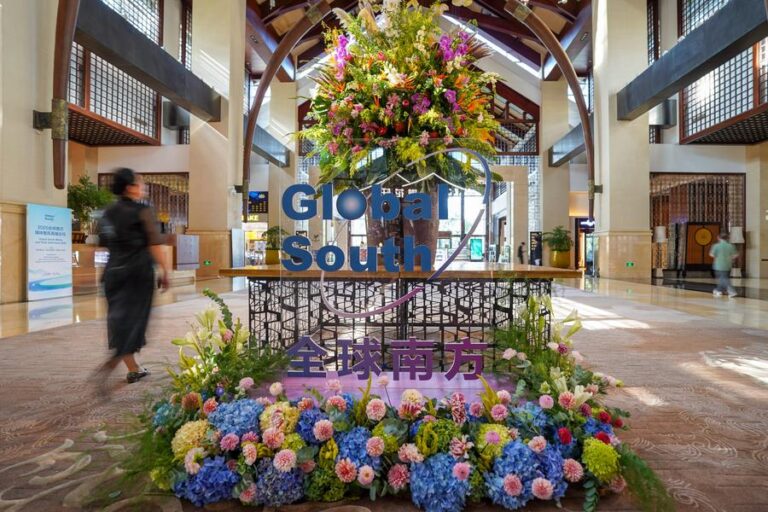* Some 500 journalists, scholars, government officials and entrepreneurs from 110 countries or international and regional organizations gathered in southwest China’s Yunnan Province for the Global South Media and Think Tank Forum 2025.
* Their common aspiration is to turn the Global South’s rising economic weight — representing 40 percent of global GDP and 80 percent of world growth — into an equally powerful voice in the fields of international discussion and communication.
* The event also marks the formal launch of the Global South Joint Communication Partnership Network, which features more than 1,000 media outlets, think tanks and other institutions across 95 countries and regions.
KUNMING, Sept. 5 (Xinhua) — Some 500 journalists, scholars, government officials and entrepreneurs from 110 countries or international and regional organizations convened Friday in southwest China’s Yunnan Province for the Global South Media and Think Tank Forum 2025.
Their common aspiration is to turn the Global South’s rising economic weight — representing 40 percent of global GDP and 80 percent of world growth — into an equally powerful voice in the fields of international discussion and communication.
Within five days of meeting, participants will brainstorm and contribute their wisdom to translate the forum theme, “empowering global south, navigating global changes,” into tangible solutions for practical projects.
Plenary sessions will alternate with focused workshops on peace-building narratives, AI-driven newsrooms, heritage preservation and other topics.
Two signature documents are scheduled to be released — the Yunnan Consensus, a joint pledge to expand cooperative production of news and analysis, and a research report on China’s contribution to global public intellectual products, which distills best practices from the country’s South-South initiatives.
The event also marks the formal launch of the Global South Joint Communication Partnership Network, which features more than 1,000 media outlets, think tanks and other institutions across 95 countries and regions.
This is the second edition of the forum, which is co-hosted by Xinhua News Agency, the Communist Party of China Yunnan Provincial Committee and the People’s Government of Yunnan Province. It was first held last November in Sao Paulo, Brazil.
Experts and intellectuals attending the forum point out that Global South countries have long been in a weak position in the international public opinion arena. Often as objects of observation, narration and shaping, their voices have been drowned out, their stories distorted, and the truth behind them obscured.
Professor Cheng Manli from Peking University’s School of Journalism and Communication noted that a common task for Global South countries is to break the existing international public opinion pattern and discourse monopoly, and to establish their own subject status and discourse advantage.
“The fate of the Global South should not be determined by others but shaped by us. We need strategic unity, long-term vision and political courage,” Aires Ali, former prime minister of Mozambique, told Xinhua. “The Global South is not only a geographical concept but also a voice, a force and a history full of struggle and hope. It is our common responsibility to make this voice heard, respected and cherished by our people and the entire international community.”
His view is echoed by Khalid Mubarak Al-Shafi, editor-in-chief of Qatar’s Peninsula Newspaper.
“We are in need of strengthening unity and building consensus among nations to achieve peace. We must work together to foster mutual understanding and respect, rejecting all forms of violence and discrimination,” said Al-Shafi.
Forum participants believe that cooperation among Global South media and think tanks holds great potential in the future.
In terms of maintaining peace and stability, the security deficit facing the world today requires not only political mediation and diplomatic dialogue, but also the building of bridges of understanding and communication by media and think tanks.
Participants also stress the importance of building partnerships between media outlets and think tanks.
“Knowledge must inform narratives, and narratives must reach people,” Narine Nazaryan, director of the Armenian state news agency Armenpress, told Xinhua.
Nazaryan called on media and think tanks from the Global South to create platforms that “bring academic insight and journalistic reach together, so that civilizational dialogue moves beyond declarations and becomes daily practice.”
“The Global South is home to many cultures and traditions, each with its own way of understanding the world,” Ambreen Jan, Pakistan’s federal secretary and vice minister of information and broadcasting, told Xinhua.
“The bridges we build today, with our friends in China and with all countries in the Global South, can carry practical solutions to the challenges we share,” she said.
(Video reporters: Sun Min, Xiong Xuan’ang, Wang Anhaowei, Zeng Wei; Video editors: Wang Han, Hui Peipei) ■

